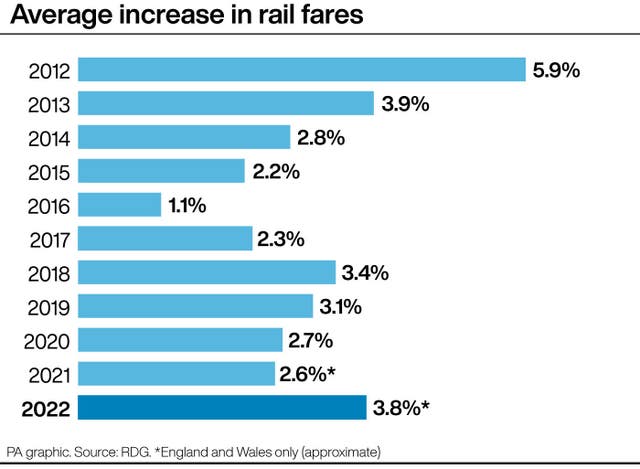
Clive Bull 1am - 4am
28 February 2022, 15:14

Campaign group Railfuture accused the UK Government of ‘stoking the fire of the cost of living crisis’.
Train passengers in England and Wales will be hit with the largest fare rises in nearly a decade from Tuesday.
Campaign group Railfuture accused the UK Government of “stoking the fire of the cost of living crisis” by enabling an increase in ticket prices of up to 3.8%.
The cap on fare rises in England and Wales matches the Retail Prices Index (RPI) measure of inflation for July 2021.

It will be the steepest increase since January 2013, according to figures from industry body the Rail Delivery Group (RDG).
A 3.8% rise would lead to hikes in the cost of annual season tickets such as:
– Brighton to London (any route): Up £194 to £5,302
– Liverpool to Manchester (any route): Up £105 to £2,865
– Neath to Cardiff: Up £70 to £1,922
The 2021 rise in fares was based on the previous July’s RPI plus one percentage point.
The UK, Scottish and Welsh governments regulate rises in around half of fares including season tickets on most commuter routes.
Railfuture's view on tomorrow's 3.8% rise in UK Rail Fares: "Ordinary working people are feeling the squeeze like never before, yet the government is stoking the fire of the cost of living crisis with these eye-watering fare increases". Read on at https://t.co/y26tTtTsLd
— Railfuture (@Railfuture) February 28, 2022
Operators controlled increases in other fares before the coronavirus pandemic.
But governments now have control of all ticket prices after spending billions of pounds to keep services running during the virus crisis.
A Department for Transport spokesman said: “We have protected passengers by delaying these fare rises by two months and, even then, opting for a figure well below current inflation rates.
“However, we must now look to recoup some of the £14 billion which was spent to keep vital services running throughout the pandemic in a way that is fair for all taxpayers.
“By striking this balance, we will be able to encourage people back on to trains whilst funding the necessary improvements and unprecedented investment that will benefit all those who use our railways.”
Latest figures show RPI in January was 7.8%.
An RDG spokesman said: “The Government’s decision to hold fares down below current inflation is positive.
“It is important that fares are set at a level that will encourage more people to travel by train in the future, helping to support a clean and fair recovery from the pandemic.”
But Bruce Williamson of Railfuture said: “Ordinary working people are feeling the squeeze like never before, yet the Government is stoking the fire of the cost of living crisis with these eye-watering fare increases.
“How does this help get the country back to work?
Mr Williamson claimed passengers will be “bankrupted next year” if the formula for setting rail fare rises is unchanged, as inflation is “likely to hit 8%”.
A report from @cities_clean ranked UK cities bottom of Europe on affordable public transport. Find out more here: https://t.co/63LwLViYCD #cityranking pic.twitter.com/F3GmvKx6t8
— Campaign for Better Transport (@CBTransport) February 27, 2022
Paul Tuohy, chief executive of Campaign for Better Transport, said the increase in fares “couldn’t come at a worst time”, and noted that many office workers have a choice about how many days they commute.
He continued: “Higher fares and crowded trains as a result of service reductions aren’t very appealing, and risks people working from home more or driving into work instead, further adding to congestion and air pollution.”
Operators are still working to restore all the services cut in December and January amid huge staff shortages due to the Omicron coronavirus variant.
Anthony Smith, chief executive of passenger watchdog Transport Focus, said: “As some fares rise, and more of us start to travel again, it is crucial the rail industry delivers a punctual and reliable service – the key driver of passenger satisfaction.”
Labour’s shadow transport secretary Louise Haigh said: “This brutal Tory fare hike will be a nightmare for millions of passengers.
“Families are already facing tax rises and surging bills, and will now be clobbered with yet another eye-watering rise in the cost of the commute.”
Trades Union Congress general secretary Frances O’Grady said increasing the cost of rail travel is “the last thing commuters need”.
She continued: “It is vital that our rail system recovers the passengers it lost at the start of the pandemic, especially if we want to keep to our climate commitments.”
Demand for rail travel is around a third below pre-coronavirus levels.
In Scotland, a 3.8% increase in fares was implemented on January 24.
Rail fares in Northern Ireland are set by state-owned operator Translink, which does not use RPI.